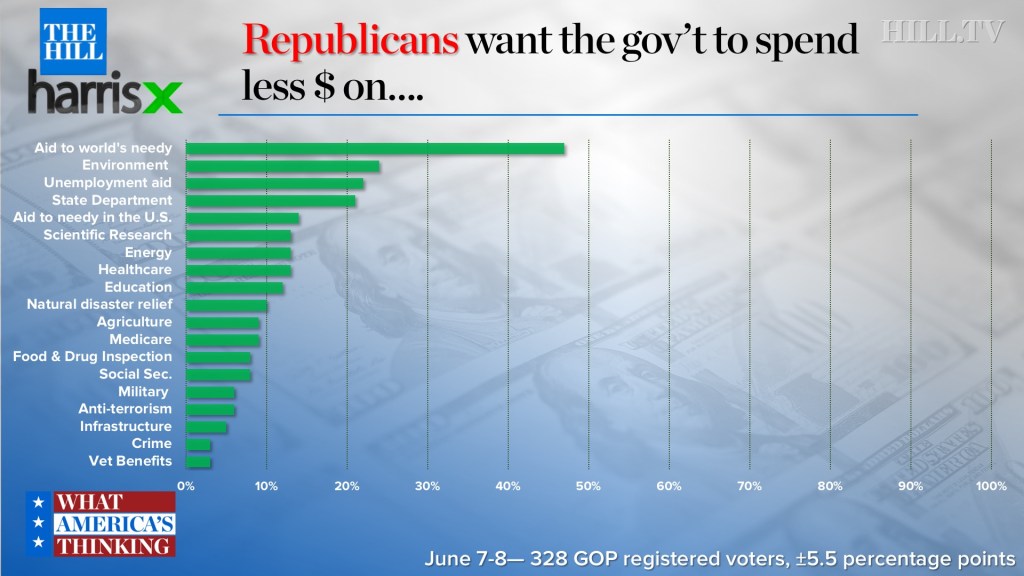Republican voters, who have traditionally been perceived as favoring reduced government spending, are not keen on cutting federal spending that supports specific areas like health care and disaster relief, according to a new poll.
In a Hill-HarrisX survey of registered voters, majorities of GOP respondents said they did not support reducing federal spending in all 19 budget areas listed, from foreign aid and unemployment relief to infrastructure and education.
 Republican respondents were most interested in reducing spending for needy people living in other countries, with 47 percent saying they were in favor of cutting funding for those types of programs. Thirty-eight percent said they wanted to spend the same amount, while 15 percent said they wanted to increase foreign aid.
Republican respondents were most interested in reducing spending for needy people living in other countries, with 47 percent saying they were in favor of cutting funding for those types of programs. Thirty-eight percent said they wanted to spend the same amount, while 15 percent said they wanted to increase foreign aid.
Republicans were much less interested in cutting spending in other budget areas. Reducing funds for environmental protection was the next-most popular idea, but endorsed by only 24 percent of GOP respondents. Fifty-one percent of Republicans said they wanted to keep environmental spending the same, with 25 percent saying they wanted more funding.
Cutting spending for unemployment aid and the State Department were the next-most popular areas to reduce spending among GOP voters. Twenty-two and 21 percent of them respectively, wanted spending reductions in those areas.
The Hill-HarrisX survey was conducted June 7-8 among a statistically representative online panel of 1,001 registered voters. It has a sampling margin of error of 3.1 percentage points.
Strong majorities of Democratic respondents wanted to keep spending the same or increase it in all 19 budget areas. Reduced spending for the military was the most popular, but only 25 percent of Democrats supported it. Lower funding for the State Department was supported by 20 percent of Democratic respondents.
Among voters who identified as independents, reducing aid to the world’s needy was the most popular, with support from 35 percent of the group. Cutting funds to the State Department was supported by 27 percent of independents.
The Hill-HarrisX findings parallel recent surveys from the Pew Research Center which found little public support across partisan lines for reducing government spending. A study published in April by Pew found that Republican and Democratic support for more federal spending has increased since it polled on the topic in 2013.
In the Hill-HarrisX survey, a majority of participants wanted increased federal spending on health care, infrastructure, veterans benefits, education, Social Security and Medicare.
Majorities in the newer poll wanted to keep federal funding about the same for the State Department, agriculture, energy, food and drug inspection, unemployment aid, fighting crime, scientific research and natural disaster relief.
Some GOP officials say Washington lacks the political will to make significant cuts to federal spending.
“There is no center of gravity to reduce spending in this town, period, end of story,” acting White House chief of staff Mick Mulvney, who was a staunch supporter of spending reduction measures as a House lawmaker, said Tuesday at conference about the national debt, sponsored by the Peter G. Peterson Foundation.
—Matthew Sheffield
hilltv copyright
